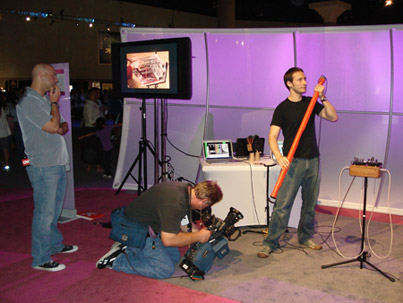Research and Discovery: Sounds from our musical future
Research and Discovery: Sounds from our musical future McGill University
User Tools (skip):
RESEARCH AND DISCOVERY
Digital instruments debut at MusiMarch Festival

Joe Malloch, a research assistant on McGill’s Digital Orchestra project, demonstrates the T-stick for CNN at the Wired Magazine NextFest in Los Angeles last September.
Courtesy of The McGill Digital Orchestra
Sounds from our musical future
High-pitched, metallic notes fill the air in the Digital Composition Studios of McGill's Schulich School of Music as composer Andrew Stewart plays the T-stick, a thin, nearly two-metre long, orange pole. As he holds the unusual instrument in front of him, tapping its ends with his fingers, a low, hollow, drum-like sound seeps from speakers nearby. A slide of Stewart's hand produces a sustained sound, called a "groan," and a shake of the stick creates jagged bursts of sound.
The T-stick is one of several new digital instruments developed in the McGill Digital Orchestra, a three-year research project at the Centre For Interdisciplinary Research in Music, Media and Technology (CIRMMT) bringing engineers, performers and composers together to discover new ways of using technology for musical expression. A number of the instruments developed in the project will be showcased March 5 at Pollack Hall as part of the live@CIRMMT concert series during McGill's MusiMarch International Festival of Contemporary Music. The event gets under way at 7:30.
Turning Gestures Into Sounds
The project's main focus, according to researcher Marcelo Wanderley, Professor at the Schulich School of Music and Director of the Input Devices and Music Interaction Laboratory, is to learn whether digital instruments can be as nuanced and expressive as traditional acoustic instruments. "It's not a gadget that people would plug into their Wii," he said. "In some cases we are pretty close to something as responsive and subtle as a musical instrument."
The new digital instruments incorporate computer software and a process called mapping that transform gestures into sounds. Based on the mapping chosen for a musician's specific gesture, sensors in the instrument send an electric signal to computer software, which converts it to a sound.
With the T-stick, researchers decided to "map" or translate tapping into a drum-like sound that rises in pitch as the musician's hands move toward the centre of the instrument. Since any gesture can be mapped to any sound — from recordings of trumpets or violins to computer-generated sounds — the possibilities are endless. Researchers, however, generally choose mappings that are intuitive or "make sense," said Ferguson, Associate Director of the Centre for Interdisciplinary Research in Music Media and Technology, and Director of the Digital Composition Studios at McGill. That's why sliding a hand along the T-stick has been linked to a smooth sound, while shaking it has been linked to a rough one. But researchers avoid overly predictable mappings to encourage the audience to watch the gestures and figure out their relationship to the sounds.
Digital Orchestra members hope these instruments will gain wider acceptance and live on after the concert. They have composed music for their new instruments and have made their design plans and software available on the Internet. "We don't want to just whistle in the dark," said Sean Ferguson. "We really want these instruments to go on and have some artistic and cultural impact."
For more information on the McGill Digital Orchestra visit www.music.mcgill.ca/musictech/DigitalOrchestra. For more on the MusiMarch International Festival of Contemporary Music, go to www.music.mcgill.ca/musimarch.
WARM-SPARK (Writing About Research at McGill-Students Promoting Awareness of Research Knowledge) is a program sponsored by the Faculty of Science, the Offices of the Vice-Principal (Research) and University Relations, NSERC, the Faculty of Engineering and the Faculty of Agricultural & Environmental Sciences. See www.spark.mcgill.ca for more information and articles.

